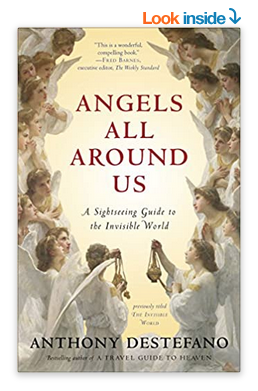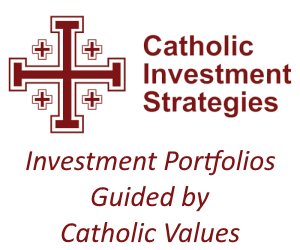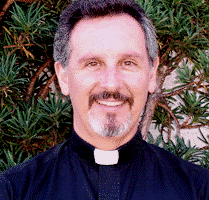BOOK: Angels All Around Us: A Sightseeing Guide to the Invisible World (formerly titled The Invisible World) , by Anthony DeStefano (Doubleday, 2011)
I usually don’t read books that are sent to me unbidden. Anthony DeStefano’s Angels All Around Us was mailed to me by Priests for Life, an organization I support financially. If I remember correctly, Fr. Frank Pavone, founder of Priests for Life, sent them to people on the mailing list (DeStefano mentions him in the second sentence of chapter 1). DeStefano has written several other books—this is the first I’ve heard of him, but not the last of his books I will read.
I’m glad I received this book!
I have more than a passing interest in things invisible, since as a priest I deal with so much on the level of  the supernatural. I have read many books on the subjects covered in this book: angels, demons, the soul, spiritual warfare, grace, redemptive suffering, heaven and hell. This is a good, popular treatment of spiritual subjects, written in an easy style, with lots of DeStefano’s personal stories added as examples.
the supernatural. I have read many books on the subjects covered in this book: angels, demons, the soul, spiritual warfare, grace, redemptive suffering, heaven and hell. This is a good, popular treatment of spiritual subjects, written in an easy style, with lots of DeStefano’s personal stories added as examples.
The author is Catholic, but this book is written for a general Christian readership. He quotes some priests and saints, but also other Christian ministers. He could have gone deeper on certain subjects, and doesn’t specifically mention purgatory, but I suspect this is so that non-Catholics won’t be put off.
“The highest forms of reality are invisible” (p. 18): love, honor, physical constants like gravity and molecular bonds—we can’t “see” them, but we know they exist and make life possible and meaningful. Because we are “hybrid” creatures (as C. S. Lewis called the body/soul beings we are), we interact with the material world through material senses and are familiar with the things we see, touch, taste, smell and hear. We are so immersed in the physical that we can find it difficult to “think about spiritual matters” (p. 19). But our souls perceive other things, and “we can understand spiritual matters in some way because we are part spirit” (p. 48).
It is because of the spiritual, invisible component that comprises each of our individual human souls that I write this review for the Catholic Business Journal, as you will discover below.
The unseen realities that affects us daily
Our work, the very material and empirical life of business, can render us unconscious of very important spiritual realities. Yet as Catholics, we cannot afford to dig around in the physical and ignore the invisible, supernatural realities that daily affect us. These supernatural realities are important—the most important—realities, and they affect us every single day, whether we realize it or not.
No matter how much we have to deal with budgets, human resources, facilities, politics, relationships and world events, there is a spiritual world just beyond our sensible reach that impacts us on the level of the soul—a pitched battle between angels and demons, a constant flow of grace from God, and our eternal destiny to consider.
DeStefano hopes to make this unseen world a little clearer so that, as he writes on p. 21:
“(1) it will be easier for you to act in sync with your moral beliefs;
(2) your life will be much fuller, richer, and more exciting than you ever imagined possible; and
(3) no amount of suffering—physical, mental, or emotional—will ever be able to destroy the profound inner sense of peace that you’ll experience on a daily basis.”
I agree. I do believe that, as an introductory study on this subject, knowing about the spiritual will help us live better Christian lives in the realm of family and business.
In chapter 2, DeStefano offers a good explanation for the existence of God—try it out on some of your atheist or agnostic friends, or better, on the people who used to believe or had more faith at one time and for whatever reason have dropped out of faith and church life.
Chapter 3 is a good introduction to the theology of angelic beings.
Throughout the book DeStefano compares and contrasts material and spiritual beings and functions. As embodied souls, we learn and know and feel through physical sensations and the movement of electrons and chemicals. This is a really slow process compared to a pure spirit who doesn’t have to reason in order to know, and who doesn’t rely on senses to experience, and who doesn’t physically move from place to place in order to change locations in space or time.
Understanding spiritual beings may seem unhelpful in the “real world,” but the contrary is true. This point makes sense as the book progresses.
The value of knowing our unseen enemy, and our much more powerful unseen allies
DeStefano’s description of the fallen angels in chapter 4 is very good and easy to understand. Who they are, what they did, and why they did it are not just a matter of speculation: we need to know our enemy!
We need to understand what motivates creatures who have permanently separated themselves from God and His plans, and why they hate us so much. Knowing their tactics gives us an advantage. I always caution people not to be too curious about demons, but a basic knowledge is what we need and what the  author offers.
author offers.
Chapter 5 is about the human soul: that we have one (and how we know we have one), what it’s for, and how it works. The soul animates the body, reflects the image of God—in Whose image we are created (the image of a God Who is pure Spirit)— and “elevate[s] us to the degree that we’re able to share in the life of the Kingdom of God” (p. 97).
After describing angels and demons and human souls, chapter 6 digs into the difficult (and oft denied) topic of spiritual warfare: the constant battle taking place outside the material world for each of our souls.
Thank God we have guardian angels and access to grace through faith and the Sacraments, because left to ourselves we could never beat a foe like the devil!
DeStefano outlines three main strategies the devil uses against us (pp. 112-119):
- atheism (if you don’t believe there’s a God, you’ll never repent or apologize);
- despair (okay, so maybe there is a God but I’m so bad He won’t forgive me, so I’m doomed and might as well keep on sinning); and
- subjectivism (man is the measure of all things, what’s good for you may not be good for me: I make the rules, so God is irrelevant).
Knowing these tactics gives us an edge. Seeing them at work in ourselves, or family members and co-workers and in the popular culture around us can be unnerving, but once we can label what is evil, we give God power over it!
The battle has already been won
Once we give God power over evil, then His power is unleashed in us by means of His grace.
Chapter 7 is not systematic theology on the categories of grace. Instead, it’s a teaching on how God helps us, and how to remain open to the grace He is continually pouring on us, His children.
In this chapter, DeStefano gives a very encouraging lesson on the meaning of Christ founding the Church and saying to us that “the gates of hell shall not prevail against it” (Matthew 16:18): hell is surrounded by defensive walls because God became man and His sacrifice has won the victory! The demons are “fighting a losing battle; in fact, their only satisfaction has been to win as many souls as they can and offend God in the process” (p. 138), but they’ve lost, and we’re the ones with the heavy artillery: “we’re the ones who are supposed to be storming the gates of hell” with the grace of God (p. 137)!
Chapter 8 is a great explanation of the mystery of human suffering. This causes so many people to deny the existence of God. So many question how a good God could allow bad things to happen, especially to good people. DeStefano addresses this.
“It’s impossible to understand what suffering really is unless we pull back the veil of human sorrow and look beyond the things we see and feel when we’re in pain. When we do that we realize that there’s a lot more to suffering… that’s invisible” (p. 143). God did not create suffering, but He did create us humans to be free to choose a loving relationship with God—we’re not robots, we can’t be forced to love (because if it’s forced, it’s not love). But because suffering exists, God permits it, “but to transform it; to bring good out of it—more good, in fact, than would have been possible if Adam and Eve hadn’t sinned in the first place” (pp. 148-149).
We must let God be God
Re-read that last sentence: More good is available in the world after the loss of paradise: God is more powerful than sin! Don’t think this doesn’t tweak the evil one: his plan to destroy God’s works has only resulted in God doing more good!
Of course, when you’re in pain or under heavy temptation, this may not be all that helpful—it’s intellectually powerful, but it doesn’t assuage suffering. This is where our faith in Christ’s presence and in the transforming power of the Cross can help us. God knows that as a result of sin and weakness, suffering and the Cross is what works best to change us.
God is a loving coach, training us and exercising us through pain to new heights of ability, like athletes or musicians: the price of growth in any field of life is pain and sacrifice in some way.
“By experiencing all the different kinds of anguish that we go through, Christ gave meaning to human  suffering. Before Christ, all suffering was worthless. On a purely natural level, it may have helped people to grow and mature (as it still does today), but it had no spiritual value whatsoever. When Christ used suffering to save the world, he transformed it into a weapon to combat evil” (p. 155).
suffering. Before Christ, all suffering was worthless. On a purely natural level, it may have helped people to grow and mature (as it still does today), but it had no spiritual value whatsoever. When Christ used suffering to save the world, he transformed it into a weapon to combat evil” (p. 155).
DeStefano ends his book on what is commonly referred to as the “last things”: death, judgment, heaven and hell. As Christians we believe that there is a whole life waiting for us beyond this world. Death is not the “end” of us—it’s the temporary separation of body and soul. But we retain our individuality (unlike the teachings of Buddhism and other eastern religions), our personality, our consciousness, and memories.
At death you don’t cease to be. Instead, you “become more of who you really are…your ‘best’ you…lives on in Heaven” (p. 166). You will still see: “not with your eyes, of course, but with your soul, with your intellect. Your soul doesn’t need your eyes to see” (p. 167). We will experience individual judgment and its eternal consequences (heaven or hell), then we will experience, at the end of time, the final (or general) judgment, where we will see not only our own lives but everyone else’s and we’ll “know the truth of ourselves, and the truth about one another.
At that time, every action of our lives will be ‘judged’ for all to see—and we’re going to be shown what all those actions led to.” And we’ll get all the answers to all the “why” questions: why did this person have to die? Why did that bad thing happen to me? Why did 9/11 happen? Finally we will know. Then there will be the resurrection of our bodies: the souls in heaven and hell will be given their bodies back, because it’s part of what it means to be human, to have body and soul together. DeStefano’s description of hell in light of bodily sensation is sobering to say the least. And heaven will be exciting, full of color and sound (yes, with the re-uniting of our body and soul, our eyes and senses will be back) and action, and animals, and perfection!
The real “bottom line”
In the midst of a busy life, we need to be able to poke our heads above the everyday material world and remember that whatever we’re doing—right now—has eternal consequences for ourselves and others.
It’s not just about making money, growing a business, or maintaining a home and family. Our souls are constantly affected not only by this world, but by an invisible world. Our life and work is a part of it, and the invisible world is a part of us. We’re interacting with it whether we know it or not, so better to know it!
—this article was originally published in the Catholic Business Journal on Aug 12, 2011
RELATED RESOURCES:
- Angels All Around Us: A Sightseeing Guide to the Invisible World, by Anthony DeStefano
Fr. Chris Heath is a priest of the Diocese of Orange, California, and has served as founding chaplain of Catholics at Work OC and pastor at... MORE »


